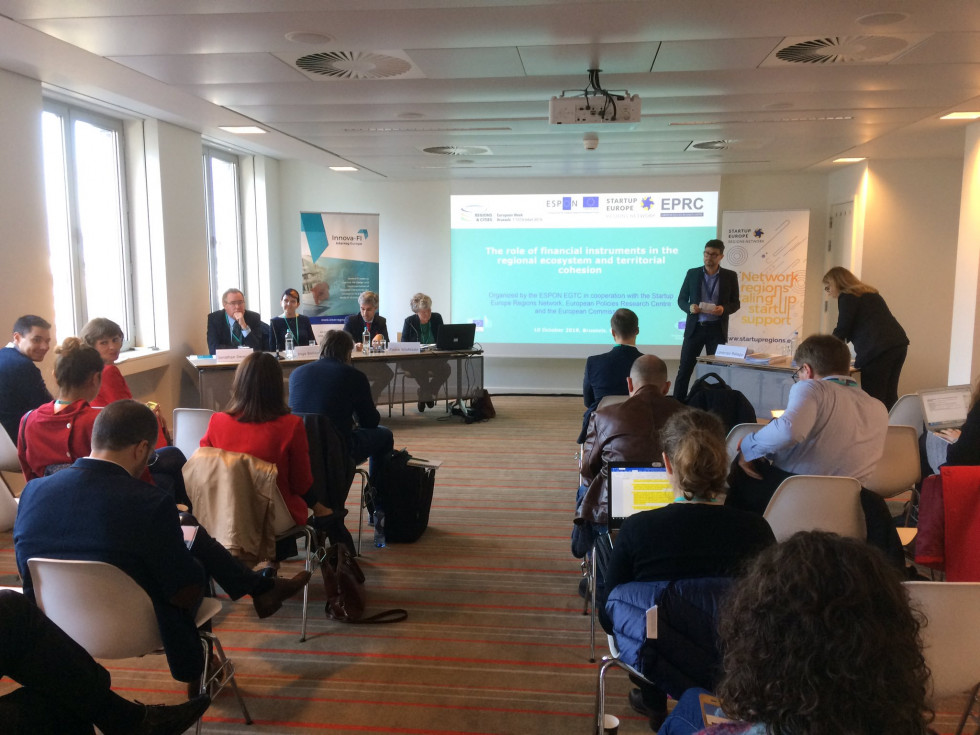Financial Instruments for Innovation
- Government Office for Development and European Cohesion Policy
The role of financial instruments in the regional ecosystem and territorial cohesion
Policy proposals for 2021-27 envisage a prominent role for Cohesion policy FIs and significant remodelling of EU level instruments. Drawing on the findings of a recent ESPON study on FI, this workshop explored how ESIF FIs can contribute to cohesion. The workshop also presented results of the interregional project “Financial Instruments for Innovation (Innova-FI)” and two case studies as concrete examples to illustrate the project’s impact.
Moderator Lorenzo Palego (t33, IT) gave an introduction about the attraction of private funding and expertise and emphasised the importance of analysing how to tailor FIs to specific regional requirements which were followed by presentations of four experts:
- Alexandre Almeida (National Innovation Agency of Portugal, PT)
- Inga Beiliuniene, (Investment and Business Guarantees, LT)
- Jonathan Denness, (DG REGIO, BE)
- Fiona Wishlade, (University of Strathclyde, UK)
Study: Value of cohesion policies
Fiona Wishdale presented the results of a study that the University of Strathclyde undertook on behalf of ESPON to explore the added value of cohesion policies. The study was based on data from 2007-2013 and showed that in total, there were €15 billion invested in FIs across Europe. The objective was to better understand the distribution of money on a regional level.
Quality of government in respective countries turned out to be a key driver in the choice of financial product as the guarantees and equities were higher in those states and loans more widespread. Overall the study shows that enterprises account for 86% of all FI investments.
The findings also revealed that there is no consistent territorial pattern with regard to the use of ESIF FIs as this depends on the domestic context of culture, experience and administrative capacity. Eventually, the question of cohesion policy can be posed two ways: is it too small to be worth the effort or is it so small that we need to make it worthwhile?
Either way, regulatory requirements shouldn’t undermine policy objectives and it is necessary to conduct assessments to identify needs with a focus on the regional dimension of supply and demand.
Innova-FI: Financial Instruments for Innovation
Alexandre Almeida gave an overview of activities and results achieved so far during the first year of Innova-FI project. FIs are important elements in the implementation of innovation policy and especially in promoting a new landscape or innovative business and as much as they are popular, different regions have different levels in implementation. Therefore, the goal of Innova-FI is to work together to better understand the landscape and establish borderless partnerships to create a harmonised environment for the FI system.
For this, Innova-FI developed a mapping tool for regional identification and analysis. Altogether, the project involves 8 partners from 8 countries, one of them based in Portugal, a country which has undergone economic transformation in recent years. Portugal Ventures’ target is to support a new breed of technology-based firms through pre-seed and seed investments and create four funds for the digital, engineering and manufacturing, life sciences and tourism sectors.
Invega: financially viable projects
Inga Beiliuniene presented insights into the Lithuanian market and the work of Invega, a fund of funds manages more than 30+ instruments and invested more than €700 million during its 18 years of existence. Invega is focusing on the sectors of IoT, AI, SaaS, healthcare, photonics, robotics, energy efficiency and financial technology. Beiliuniene also mentioned the success of the Baltic Innovation Fund, that registered 43% growth and mobilised €435 million.
Recommendations
In conclusion, the panel of experts agreed that it is essential to:
- tailor financial products to the local context
- nurture trust and good working relations with financial intermediaries
- maintain flexibility to respond to changing conditions


